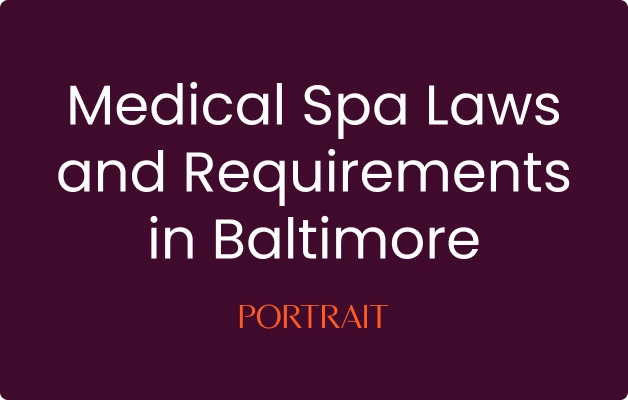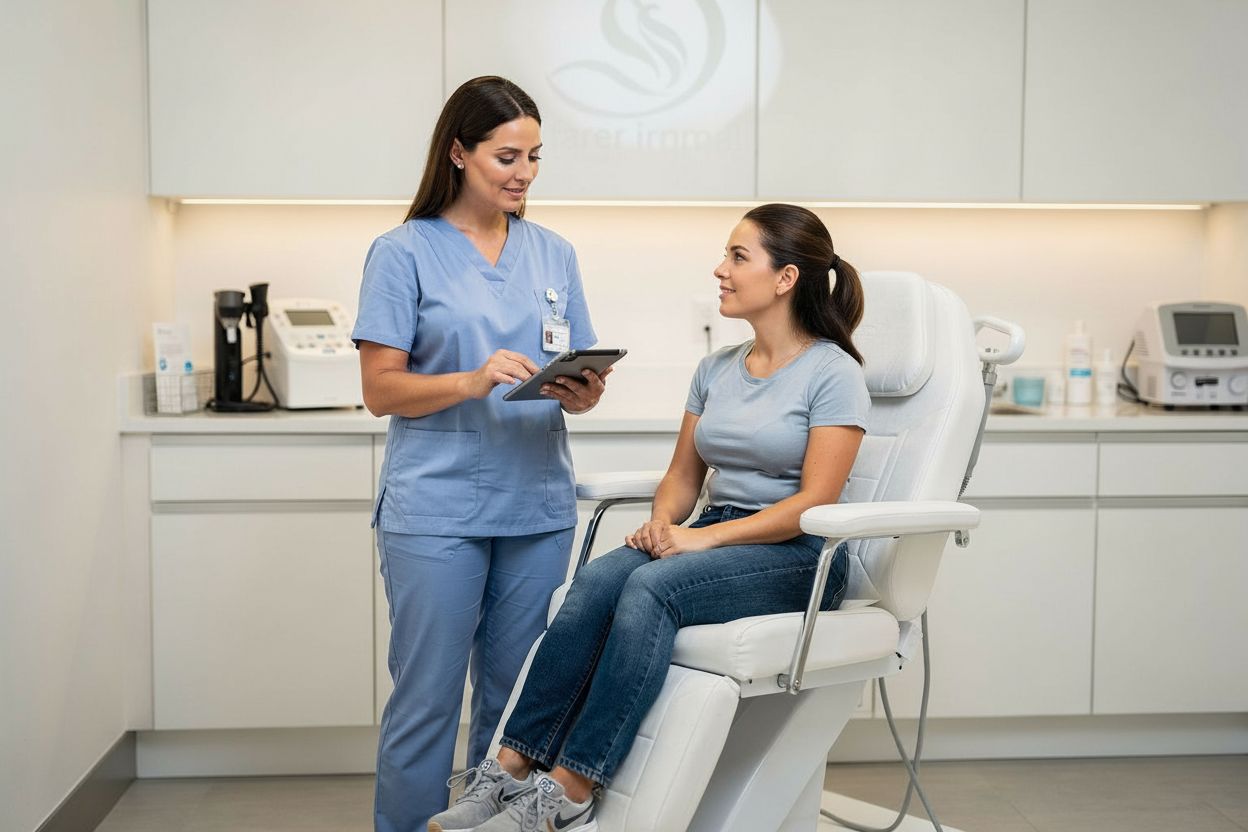Medical Spa Laws and Requirements in Baltimore

Empowering Professionals at Every Stage
Portrait offers strategic expertise to help you make informed decisions and achieve long-term success.
Book Intro CallWhile Maryland law does not provide a single definition for a “medical spa,” it classifies them as medical service providers and limits ownership to state-board certified physicians and CNPs. This guide will walk you through the essential state and Baltimore-specific regulations for opening and operating your clinic compliantly. We are here to provide the clarity you need to build your practice with confidence.
How Medical Spa Laws Work in Baltimore
While Baltimore law doesn't formally define a “medical spa,” these establishments are fundamentally different from traditional day spas. The key distinction is that med spas are classified as medical service providers, offering procedures like injectables and laser treatments that require clinical oversight. This classification is the primary reason for stricter med spa regulations, which are designed to ensure patient safety and uphold professional medical standards.
Achieving med spa compliance in Baltimore requires navigating the rules of several state-level governing bodies. The primary agencies involved are the Maryland Board of Physicians and the Maryland Board of Nursing, which oversee the licensing and scope of practice for the professionals who can own a med spa. Depending on the services offered, the Maryland Board of Cosmetologists may also have jurisdiction over certain aesthetic procedures and practitioners.
Medical Spa Requirements in Baltimore
Understanding the medical spa requirements in Baltimore is central to building a successful practice. The state's med spa regulations are specific about who can own a med spa, restricting ownership to state-board certified physicians and Certified Nurse Practitioners. Beyond ownership, achieving med spa compliance involves adhering to strict scope of practice rules, obtaining proper insurance, following patient consent procedures, and meeting federal OSHA and HIPAA standards. These medical spa laws in Baltimore ensure patient safety and set a professional standard for all aesthetic clinics.
Medical Spa Ownership & Business Structure Requirements in Baltimore
Maryland's medical spa ownership laws are clear and restrictive, directly impacting who can open a med spa in Baltimore. Ownership is limited exclusively to state-board certified physicians and Certified Nurse Practitioners (CNPs). This approach aligns with the Corporate Practice of Medicine (CPOM) doctrine, which generally prohibits non-licensed individuals from owning a medical practice to ensure clinical decisions remain separate from corporate interests.
These med spa regulations mean that non-physicians cannot directly own a clinic, though some states permit alternative structures like Management Services Organizations (MSOs). While the MSO model is a common legal framework in CPOM states, its specific use in Maryland requires further legal analysis. Ultimately, a licensed physician or CNP must serve as the medical director, overseeing all clinical operations to maintain med spa compliance.
Facility, Licensing, and Compliance Requirements in Baltimore
While Baltimore does not issue a specific "medical spa license," the path for how to open a med spa in Baltimore is governed by state-level professional licensing. Maryland law mandates that med spa ownership is restricted to state-board certified physicians and Certified Nurse Practitioners (CNPs). Beyond this, you must follow standard business formation processes, as specific city-level facility permits are not detailed in the main med spa regulations.
Operating a compliant practice also means adhering to federal health and safety standards that apply to all medical facilities. This includes full compliance with OSHA workplace safety rules, such as having bloodborne pathogen plans, and following HIPAA laws to protect patient data. These federal requirements are a non-negotiable part of the medical spa requirements in Baltimore and are essential for patient and staff safety.
To protect your practice, Maryland's med spa regulations require you to carry malpractice insurance, and securing commercial general liability coverage is also a critical step. Your advertising must be truthful, clearly stating practitioner qualifications and procedure risks to avoid misleading claims. Finally, proper recordkeeping is a key component of med spa compliance, with patient files and consent forms managed according to professional medical and privacy standards.
Who Can Perform Medical Spa Procedures in Baltimore?
Maryland’s med spa regulations are specific about who can perform aesthetic procedures in Baltimore. According to state law, services must be performed by state-board certified physicians and Certified Nurse Practitioners (CNPs). This restriction is a core component of the medical spa laws in Baltimore and directly impacts your staffing model.
These licensed professionals are authorized to perform a range of services, including injectable neuromodulators, dermal fillers, laser hair removal, and body sculpting. While the state does not provide a strict definition separating medical from cosmetic procedures, the distinction is relevant for tax purposes, as some cosmetic services are taxed differently. Understanding this nuance is essential for maintaining med spa compliance and managing your finances correctly.
The roles for other professionals, such as physician assistants, registered nurses, and aestheticians, are not clearly defined within Maryland's primary med spa regulations. Similarly, specific rules regarding supervision levels, delegation, or required training for procedures like IV therapy and microneedling are not explicitly detailed. This ambiguity in the law makes it critical to seek legal counsel to interpret the full scope of practice and ensure your clinic meets all medical spa requirements in Baltimore.
Laser & Energy Device Regulations in Baltimore
Maryland's med spa regulations are direct about who can operate energy-based devices in spas in Baltimore. According to the state's scope of practice, only state-board certified physicians and Certified Nurse Practitioners (CNPs) are authorized to perform procedures like laser hair removal. This restriction on delegation is a fundamental aspect of the medical spa laws in Baltimore, shaping how you must staff your clinic for med spa compliance.
While the rules on who can perform procedures are clear, the state does not offer a specific legal definition for lasers or other energy devices. Furthermore, the regulations do not outline specific training, certification, or adverse event reporting obligations beyond the standard requirements for licensed medical professionals. This makes it important to consult legal counsel to interpret these gaps and meet all medical spa requirements in Baltimore for safe operation.
Medical Spa Enforcement, Penalties & Risk Management in Baltimore
Violating the medical spa laws in Baltimore carries significant consequences, as state boards actively enforce these rules to protect public safety. Enforcement of the med spa regulations is primarily handled by the Maryland Board of Physicians and the Maryland Board of Nursing. If these bodies find a clinic is non-compliant, they can issue cease-and-desist orders, impose substantial fines, and pursue disciplinary action against a professional's license, including suspension or revocation. Understanding the common pitfalls is the first step toward building a resilient practice.
Many compliance issues arise from a few common missteps. Here are the primary areas where spas in Baltimore run into trouble:
- Improper Delegation: Allowing unlicensed or unauthorized personnel to perform medical procedures, which in Maryland are reserved for physicians and CNPs.
- Unlicensed Practice of Medicine: This often relates to ownership structures that violate the state's rules on who can own a med spa, effectively allowing non-physicians to control a medical practice.
- False or Misleading Advertising: Making unsubstantiated claims about treatment outcomes or misrepresenting the qualifications of practitioners.
- Inadequate Documentation: Failing to maintain proper patient records, consent forms, and protocols required by HIPAA and state medical boards.
Proactive risk management is the foundation of long-term med spa compliance and is essential for any professional figuring out how to open a med spa. Adhering to the medical spa requirements in Baltimore not only protects you from penalties but also builds patient trust. Here are some best practices to integrate into your operations:
- Conduct Regular Compliance Audits: Periodically review your clinic’s procedures, documentation, and staffing against Maryland's med spa laws by state to identify and correct potential issues before they become problems.
- Implement Robust Staff Training: Ensure every team member understands their specific scope of practice, safety protocols, and the importance of patient confidentiality.
- Maintain Meticulous Records: Keep detailed and organized records for every patient, including signed consent forms, treatment notes, and medical histories. This documentation is your best defense in an audit or dispute.
- Consult Legal and Professional Experts: Given the ambiguities in some regulations, partnering with legal counsel familiar with Maryland's healthcare laws provides critical clarity and guidance for your practice.
Stay Compliant with Portrait Care in Baltimore
Building a compliant medical spa in Baltimore hinges on a few critical pillars. Ownership is strictly limited to state-board certified physicians and Certified Nurse Practitioners, who are also the only professionals authorized to perform most aesthetic procedures. While there isn't a specific 'med spa license,' your practice must adhere to all federal OSHA and HIPAA standards, maintain proper insurance, and ensure all advertising is truthful. Meticulous recordkeeping and proactive risk management are not just best practices—they are essential for protecting your business and your patients.
This article is for informational purposes only and does not constitute legal advice. We strongly encourage you to consult with a qualified healthcare attorney to address your specific circumstances.
At Portrait Care, we provide the technology and support to help you manage these requirements with confidence. Our platform is designed to give you the tools you need to run a safe, successful, and compliant practice from day one. For a detailed guide on getting started, you can learn more about opening a compliant med spa with our comprehensive resources. See how our all-in-one platform can support your growth and schedule a demo today.
One Platform.
Everything You Need.
Everything You Need.
Portrait combines the technology, support, and savings to run and scale your modern medical wellness business.
Book Intro Call
Stay Connected with Portrait Care
Subscribe to our email list and receive the latest insights, updates, and exclusive content delivered straight to your inbox.





